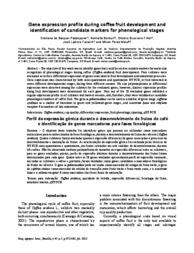Gene expression profile during coffee fruit development and identification of candidate markers for phenological stages.
Gene expression profile during coffee fruit development and identification of candidate markers for phenological stages.
Author(s): GASPARI-PEZZOPANE, C. de; BONTURI, N.; GUERREIRO FILHO, O.; FAVARIN, J. L.; MALUF, M. P.
Summary: The objective of this work was to identify genes that could be used as suitable markers for molecular recognition of phenological stages during coffee (Coffea arabica) fruit development. Four cultivars were evaluated as to their differential Expression of genes associated to fruit development and maturation processes. GEne expression was characterized by both semi?quantitative and quantitative RT?PCR, in fruit harvested at seven different developmental stages, during three different seasons. No size polymorphisms or differential expression were observed among the cultivars for the evaluated genes; however, distinct expression profiles along fruit development were determined for each gene. Four out of the 28 evaluated genes exhibited a regular expression profile in all cultivars and harvest seasons, and, therefore, they were validated as candidate phenological markers of coffee fruit. The gene ??galactosidase can be used as a marker of green stage, caffeine synthase as a marker of transition to green and yellowish?green stages, and isocitrate lyase and ethylene receptor 3 as markers of late maturation.
Publication year: 2012
Types of publication: Journal article
Unit: Embrapa Coffee
Observation
Some of Embrapa's publications are published as ePub files. To read them, use or download one of the following free software options to your computer or mobile device. Android: Google Play Books; IOS: iBooks; Windows and Linux: Calibre.
Access other publications
Access the Agricultural Research Database (BDPA) to consult Embrapa's full library collection and records.
Visit Embrapa Bookstore to purchase books and other publications sold by Embrapa.

